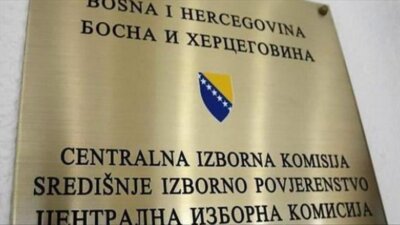The financing of political parties in Bosnia and Herzegovina is always an interesting topic because in the process of financing, whether it is an election year or a non-election year, irregularities occur almost as a rule, and the violation or circumvention of the Law on the Financing of Political Parties becomes a common behaviour of parties.
According to the Law on Financing of Political Parties in Bosnia and Herzegovina, financing is prohibited to: administrative bodies of the state of Bosnia and Herzegovina, entities, cantons, Brčko District of Bosnia and Herzegovina, and city and municipal bodies. Financing of political parties is also prohibited for private companies that have concluded a public procurement contract with the executive authorities at all levels in BIH if the value of the contract in one calendar year exceeds the amount of 10,000.00 KM.
What is characteristic of parties in the last few years is that they have stopped reporting donations from private companies and enterprises, and this is not without reason. According to TI BiH data, the parties reported 50 per cent fewer donations for the 2020 local elections than for the previous local elections when they reported only 700,000 KM.

The reason lies in the fact that a large part of contributions to the parties came from illegal sources, that is, from legal entities that did business with the authorities, and as reports of this illegal behaviour became frequent, the parties, instead of eliminating this type of behaviour, simply decided not to report them.
In one of the reports for the local elections in 2020 published by TI BiH, it is stated that the company BOSSIL doo, which appears among the donors of HDZ BIH in Vitez, received the job of building an access road worth over 329,000 KM from the municipality of Vitez in 2019 in which HDZ is in power. It was, of course, a prohibited item. Also, in 2019, this company received contracts worth over 2.4 million KM from the municipality of Vitez, and it is indicative that it is connected with the financing of the local HDZ.
In the same way, SDA was financed by the company Akva invest from Živinica, which received a job worth 34,000 KM from the city of Živinica. The same company, in addition to the SDA, also donated to the Social Democrats (Socijaldemokrate) of BIH, and in addition to jobs from the city of Živinica, it also received other jobs from public companies for years.
The company Vlašić Gradnja from Travnik, which donated to SDA, had several concluded contracts during 2019 with the municipalities of Travnik and Novi Travnik, while the company BH Bušenje from Tuzla, which also donated to SDA, had concluded contracts with the municipality of Gračanica. Among the donors of HDZ, the donation of the company Arh concept doo, which did business with the City Administration of the City of Mostar, the municipality of Čitluk and several public institutions, was controversial.
There are a handful of similar examples.
The data of the CEC, which shows that in the non-election year 2015, the parties presented 1.1 million KM in donations from private companies, and only 68,000 in 2021, sounds almost unbelievable, which clearly proves that the parties hide the donations they receive from private companies. It is also interesting that this year SNSD reported the first donations from private companies after several years (30,000 KM).
Srđan Traljić from Transparency International tells Infoveza that most political parties hide their real financiers and do not report these donations, which TI BiH reported in previous years.
“The CEC imposed sanctions, and this led the parties to simply stop reporting these donations. We have big political parties that have not reported a single brand of donations for years,” says Traljić.
This statement is supported by the fact that ten of the fifteen largest political parties in Bosnia and Herzegovina did not show a single stamp of donations from private companies for the past year. NIP, SBB, SDS, PDP, DNS, Naša Stranka, DEMOS, ASDA, Ujedinjena Srpska and Socijalistička Srpska Partija claim that none of the private companies are financing them, and only small donations were presented by SDA, HDZ, SNSD, SDP and DF.
Traljić states that at the same time the parties spend much more than they report.
“Thus, according to TI BiH data, in the last election campaign, the 15 largest parties spent almost 1.5 million KM more on just two forms of advertising than what was stated in their reports as the total cost of the election campaign, and where this money came from is unknown. However, numerous indications show that it comes from the public sector, through privileged private companies that make lucrative deals with the state”, he explains and adds that such companies are prohibited from financing parties, but someone obviously pays for the campaigns of political parties, because they spend much more than what they show.
“For this reason, we also need changes to the law on party financing, but it is also necessary to strengthen the capacities of the CEC”, concludes Traljić.

According to the report of the CEC from 2019 concerning the operation of parties, it is stated that even 51 political parties (42.86% of controlled parties) were found to have violated the provisions of the Law on the Financing of Political Parties, for which, in accordance with the Law, there is a basis for determination of responsibility, and sanctioning after the procedure has been carried out. In the same report, the CEC points out that there are indications of violations of other regulations, namely that the parties misused public funds, that they violated tax regulations, and that they violated financial regulations governing the disposal and payment of cash. It is interesting that the report from 2019 is also the last report on the operations of parties that the CEC did.
The CEC says that the latest report on the reviewed state of the financial operations of political parties dates from 2019, as it was made on the basis of data that was completed in 2020.

“In addition, the Service for Auditing the Financing of Political Parties has four people at its disposal – two auditors and two assistant auditors, and we audited 119 political parties. It is not possible to carry out a thorough audit and audit reports for so many political parties in a shorter period of time. The audit service is completing the audit of financial parties for 2020, and we expect that reports for all political parties will be issued by October of this year”, the CEC says, adding that the Central Election Commission of Bosnia and Herzegovina imposed monetary sanctions on 51 political parties where violations of the Law on the Financing of Political Parties in 2019 were determined by the audit.
Political commentator Velizar Antić points out that the financing of political parties is a big problem in Bosnia and Herzegovina, which, he says, can be clearly seen by comparing the income and expenses of parties in pre-election campaigns.

“This difference is huge even according to the available data, while it would be much larger if we had complete and precise data on how much money the parties spend in election campaigns. The main reason why this area is problematic is the fact that we have become a partocratic society and that political parties have captured society in a certain way. Parties have become the most important decision-making institutions. They inserted their members into all the institutions that should control the work of political parties and punish them if they do not work in accordance with the law. In our country, it is the case that those people who are appointed to the institutions of the system, thanks to the political parties, work in the interest of those parties, and not in the interest of the people and institutions”, warns Antić.
He adds that judicial institutions that should control and sanction illegal financing of political parties do not do so for several reasons.
“One is that they don’t have enough human capacity to control the financing of the parties, and on the other hand, we have the fact that many prosecutors and judges do not want to hold a grudge against the parties because a large percentage of them themselves got to those positions thanks to the parties. On the other hand, they know that they can lose that job if they do their job conscientiously and resent the parties and start punishing them for illegal financing. For this reason, they choose to do nothing about this issue. The situation is similar in the CEC itself. They also do not have enough human capacity to control all the income and expenses of the parties, while on the other hand, there are also people in that body who are appointed along political lines. It is difficult to expect from such people that they will work against the interests of the parties that appointed them to their positions”, said Antić.
By the way, according to CEC data, last year the parties received about 18 million KM from the budget at all levels of government.

Writes: Stefan Blagić






